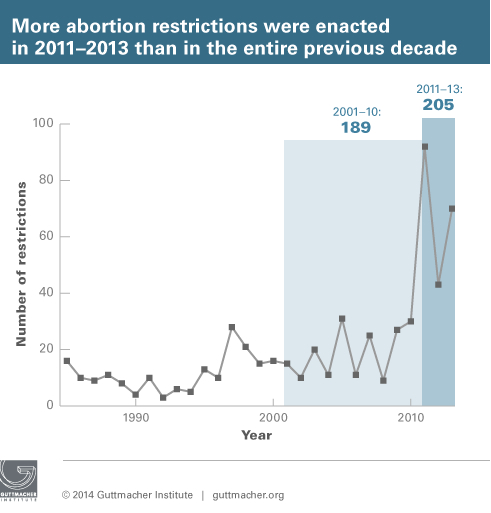Why the falling abortion rate calls for a truce in the culture war
We can all find reason to cheer the 13 percent drop in abortions


A free daily email with the biggest news stories of the day – and the best features from TheWeek.com
You are now subscribed
Your newsletter sign-up was successful
In 2011, the abortion rate in the U.S. fell to its lowest level since Roe v. Wade legalized the procedure in 1973, according to a new study from the Guttmacher Institute. The study, to be published in the journal Perspective on Sexual and Reproductive Health, found that 16.9 women per 1,000 women ages 15 to 44 had an abortion in 2011, down from 19.4 abortions per 1,000 childbearing women in 2008 and a high of 29.3 abortions per 1,000 in 1981.
Fewer abortions is something just about everybody can cheer, especially if the reason behind the drop isn't contentious. What constitutes "contentious?" Anti-abortion advocates might frown on an increase in the Plan B morning-after pill, which prevents sperm from fertilizing an egg if taken soon after sex; the abortion-rights side would decry a drop caused by decreased access to abortion providers.
Neither of those factors appear to be very significant, the Guttmacher study found. Instead, the 13 percent decline in abortions "coincided with a steep national drop in overall pregnancy and birth rates," says lead author Rachel Jones. That's due to both an increase in women using "highly effective contraceptive methods such as the IUD" and long-lasting birth control injections, Jones says, as well as the pregnancy-dampening effects of the Great Recession.
The Week
Escape your echo chamber. Get the facts behind the news, plus analysis from multiple perspectives.

Sign up for The Week's Free Newsletters
From our morning news briefing to a weekly Good News Newsletter, get the best of The Week delivered directly to your inbox.
From our morning news briefing to a weekly Good News Newsletter, get the best of The Week delivered directly to your inbox.
The number of abortion providers did drop by 4 percent between 2008 and 2011, and the number of clinics fell by 1 percent, as Republican-controlled state legislatures enacted new restrictions, the Guttmacher team discovered. But abortion rates fell sharply even in states with fairly permissive abortion laws, and "our study did not find evidence that the national decline in abortions during this period was the result of new state abortion restrictions" or the decline in abortion providers, Jones says.
If the Guttmacher data — drawn from a survey of every known abortion provider in the nation — is correct, the abortion rate is going down largely because the rate of unwanted pregnancies is going down. That doesn't mean the battle over abortion rights is anywhere near settled.

In a separate new study, Guttmacher researchers found that collectively U.S. states enacted 205 new abortion restrictions between 2011 and 2013 — more than the number put in place from 2001 to 2010. Most of those new laws hadn't taken effect by 2011, during the period of the abortion-rate decline. Jones and her colleagues say the new laws, if upheld by the Supreme Court, will make it "more difficult, and costly, for facilities to continue to provide services and for women to access them."
Some state laws specifically target a fast-growing segment of pregnancy termination: Medication-induced, not surgical, abortion. About 239,400 of the 1.1 million abortions in 2011 were caused by the RU-486 "abortion pill" — 23 percent of all non-hospital abortions — usually within the first nine weeks of pregnancy. Medication abortions are an important counterweight to disappearing providers because they can be administered with guidance from another state via video chat.
A free daily email with the biggest news stories of the day – and the best features from TheWeek.com
So anti-abortion groups oppose medication-induced abortion and abortion rights groups oppose the increase in restrictions on abortion. Both sides — if only for this one moment — should find plenty to celebrate in this drop in the abortion rate. Not exactly peace in our time, but cause, certainly, for a brief pause in the thorniest battle of the culture war.
Peter has worked as a news and culture writer and editor at The Week since the site's launch in 2008. He covers politics, world affairs, religion and cultural currents. His journalism career began as a copy editor at a financial newswire and has included editorial positions at The New York Times Magazine, Facts on File, and Oregon State University.
